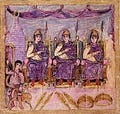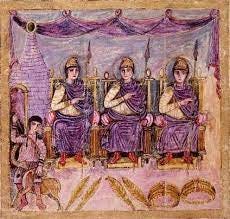If the Britons – shorn of Roman assistance now – had only the Saxons to contend with then they may still have won out. The third-century fortifications along the Eastern seaboard served them well in this respect. But the Picts, swarming over Hadrian’s Wall at will, threatened the country’s integrity in a way that the still purely piratical Saxons did not. The British lacked the capacity to fight on multiple fronts, however, so a Council of Princes was held in 447 to thrash out a strategy.
There were two dominant voices at this Council – Vortigern, whose territory lay in North Wales, and Ambrosius, who reigned in the far South West. Ambrosius longed to restore the link with Rome, and if that could not be done – if the Eternal City was now too weak to offer meaningful assistance – then to make the island of Britain (as much as might be possible) a mini-Imperium in and of itself. Ambrosius was steeped in Roman thought, Roman principles, and Roman culture. He was a Christian who believed that the Empire had been ordained by God as the cradle within which Christianity could grow and flourish. He read and reflected continually on the ancient founding stories – how Aeneas had steered the Trojans to Italy and how his great-grandson Brutus had brought that seed and spirit to Britain. Romanitas, for Ambrosius, was not a set of customs and traditions that ought to be restored, but a dynamic, multi-layered reality, powered by the Hand of God, which absolutely had to shape and inform political and social life.
Vortigern, Ambrosius’s rival, was cut from a very different cloth – an ambitious Celtic chieftain, whose people had arrived in Britain after the Trojans but prior to the Romans. He cared not a fig for either Brutus or Aeneas, and he viewed Rome’s departure as a chance for Britain to fashion its own identity and become a sovereign, self-sufficient state. But that could not be done all at once. Vortigern suggested a tactical alliance with the Saxons as a first step, offering them the Isle of Thanet off the Kentish coast as a base and employing them as mercenaries against the Picts. Stirred by his passion, his fellow leaders agreed to the plan, as did the Saxons, and for eight years all went well. But when the mission had been accomplished and it was time to go back home, Hengest, the Saxon war leader, refused to leave. He was thinking in terms of long-term settlement now, and he demanded wider lands and a permanent continuation of the annual allowance Vortigern gave his men.
In 456, Vortigern married Hengest’s daughter, hoping thereby to formalise and cement the pact between Briton and Saxon. He handed Hengest the whole of Kent as well, and for a decade and a half it appeared that his policy of accommodation was again bearing fruit. But he was naive in the extreme – blinded by hatred of Rome and puffed up with his fantasy of an independent Britain. Hengest had been biding his time and bringing more men over from Denmark and Germany all the while – Angles and Jutes as well as Saxons. In the summer of 473 he showed his hand, bursting out of Kent and breaking the power of the British army. Vortigern retreated to North Wales, and the whole land lay open to the Saxons apart from the corner resolutely held by Ambrosius.
The Great Saxon Breakout was a time of unparalleled trauma, but also a moment of collective awakening. With men slaughtered like cattle and women and children carted off into slavery, people remembered the virtues of Ambrosius – the dignity of his manner, the discipline of his soldiers, and the safe, well-run towns and villages of his domain. There was, it seemed, something to be said for the old Roman ways after all. Warriors who survived the Saxon surge flocked to his standard and Ambrosius was soon poised to strike. First he took out Vortigern and his remaining followers then moved against the Saxons and drove them all the way back to Kent. He paused in London and men wondered how far he would pursue the foe and whether he intended to push him into the sea.
Then Blaise, the Grail Priest, came up from Glastonbury on the morning of the Autumn Solstice. He took Ambrosius to the White Tower and led him down a secret stairway to where the Head of Brân the Blessed lay uncorrupted in the cavern carved by the survivors of the Ancient Irish War. And it seemed to Ambrosius, in the stillness of that chamber, that the King spoke mind to mind with him, advising him how to address the populace who were waiting for his proclamation up above in the September sun.
So Ambrosius returned and sat down in the High Place with his brother Uther to his right and Uther’s son Arthur to his left. He was crowned King of Britain at noon by Blaise, then stood before the people and declared:
‘Men and women of Troia Nova. This is as far as we go. The reconquest of Kent is a task for my successors. Our ships shall patrol the Channel and we will not allow the enemy to add reinforcements. But we will take the fight no further. We need to rebuild and restructure and restore the peace and security we knew under Rome. And we will succeed in this, I assure you. I will not assume the purple. I will not march on Rome. I am neither Carausius nor Magnus Maximus and I am certainly not Constantine. I am Ambrosius, and though the Empire be now but a shadow, I will bring the Pax Romana back again to these shores.’
Lords and commoners alike rejoiced in his solidity, and Ambrosius was true to his word for fifteen years until he left this world. He laid a foundation, and those that came after, particularly Arthur, built on that platform to stunning effect.



